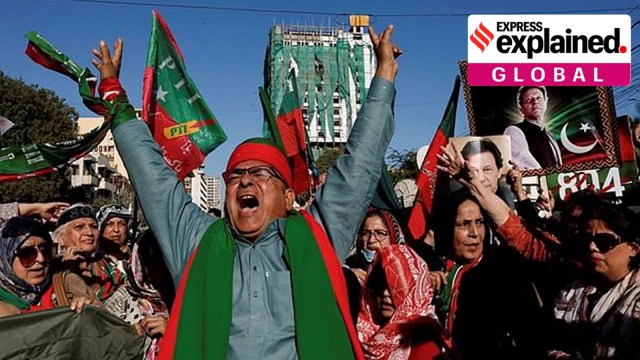Why does the Pakistan government want to ban Imran Khan’s political party, PTI?
“In view of the foreign funding case, May 9 riots, and the cipher episode as well as the resolution passed in the US, we believe that there is very credible evidence present to have the PTI banned,” Information Minister Atta Tarar said. What are these cases?
 Supporters of former Prime Minister Imran Khan's party, the Pakistan Tehreek-e-Insaf (PTI), chant slogans as they gather during a protest in Karachi. (Reuters photo/File)
Supporters of former Prime Minister Imran Khan's party, the Pakistan Tehreek-e-Insaf (PTI), chant slogans as they gather during a protest in Karachi. (Reuters photo/File)Imran Khan’s party Pakistan Tehreek-e-Insaf (PTI) will be banned for allegedly trying to create unrest in the country, the Pakistani government announced on Monday (July 15).
It also said that Imran, the jailed former Prime Minister, Arif Alvi, a founding member of the PTI who served as President of Pakistan from 2018-24, and Qasim Suri, a PTI member who was Deputy Speaker of the National Assembly from 2018-22, will be charged with treason.
“In view of the foreign funding case, May 9 riots, and the cipher episode as well as the resolution passed in the US, we believe that there is very credible evidence present to have the PTI banned,” Information Minister Atta Tarar said. What are these cases, and the “May 9 riots”?
The foreign funding case
In 2014, one Akbar S Babar, a founding member of the PTI who was expelled from the party in 2011, filed a petition to the Election Commission of Pakistan (ECP) alleging that PTI had illegally received millions of rupees in foreign funds between 2009 and 2013.
In 2018, the ECP set up a scrutiny committee which, in its report released in January 2022, said PTI had received funding from foreign nationals and companies (which is illegal in Pakistan), under-reported funds, and concealed dozens of its bank accounts.
“According to the report, the party under-reported an amount of Rs 312 million over a four-year period between FY 2009-10 and FY 2012-13. Year-wise details show that…over Rs 145 million was under-reported in FY 2012-13 alone,” Dawn said in a report.
An investigation by the Financial Times in July 2022 showed that PTI received funds from Arif Naqvi, founder of the Dubai-based Abraaj Group, and Sheikh Nahyan bin Mubarak al-Nahyan, a member of Abu Dhabi’s royal family.
The following month, the ECP found PTI guilty of accepting funds from overseas Pakistanis. But in April 2023, the Islamabad High Court said there was not enough evidence to connect Imran with the prohibited funding his party is said to have received.
The cipher case
The case pertains to the disclosure by Imran of a classified cable (or cipher), which was sent to Islamabad by Pakistan’s ambassador in Washington in early 2022. Imran claimed that the cable — which allegedly contained a “threatening message” from the US — was proof that the Americans were involved in his removal as Prime Minister. Imran was ousted from office in April 2022 after he lost a no-confidence vote in Parliament.
In August 2023, the American news outlet The Intercept reproduced a portion of the purported cable. It contained an account of a purported meeting that took place on March 7, 2022, between US officials and the Pakistani ambassador, at which the Americans purportedly expressed displeasure at the neutral position taken by Imran on Russia’s invasion of Ukraine.
Soon after the publication of the report, Pakistan’s Federal Investigation Agency (FIA) registered an FIR against Imran under Section 5 of the Official Secrets Act, 1923 for making the contents of the classified cable public.
In January this year, Imran was convicted of treason, and was sentenced to 10 years in the cipher case. However, on June 3, an appeals court overturned this judgment and acquitted him in this case.
May 9, 2023 riots
On May 9, 2023, a series of riots rocked the country over a period of around 24 hours. The violence began soon after Imran was arrested in a corruption case from the premises of Islamabad High Court.
Thousands of PTI workers hit the streets in several cities, demanding Imran’s immediate release. The rampaging mobs damaged about 40 public buildings and military installations, including the residence of a top military commander in Lahore, and the Pakistani military’s headquarters in Rawalpindi.
“In total, 62 outbreaks of violence were documented, inflicting a loss of Rs 2.5 billion on the country, of which, according to the State, Rs 1.98 billion in losses were suffered by the army,” Dawn reported. At least 10 people were killed and hundreds were injured.
The rioting was seen as the culmination of the tensions between Imran and the Pakistan Army, especially after the former PM’s ouster. The Army responded by cracking down on the PTI’s leaders and workers. In the weeks that followed, more than 100 PTI leaders left the party.
Several cases were registered against Imran for allegedly inciting the public. On Monday, the Lahore police arrested Imran, who is already in jail, in connection with a dozen cases pertaining to the riots.
- 01
- 02
- 03
- 04
- 05






































